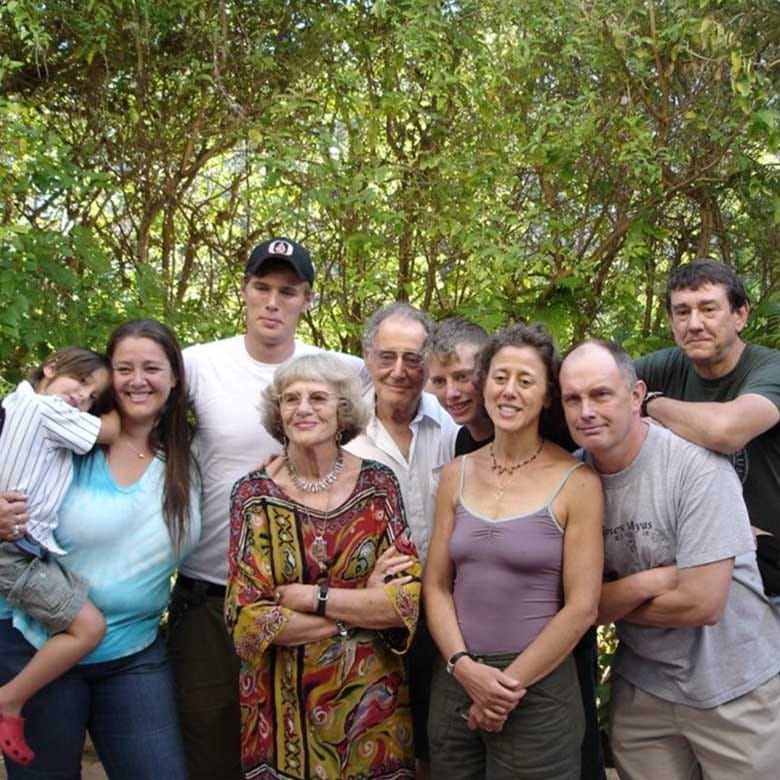
Singing in the Rain
By Sylvia Manheim and Naida Tushnet
Sylvia Manheim was born nearly a century ago in Brooklyn, NY. She says, “As a birthday present to me, the New York Giants beat the St. Louis Cardinals 4-3 that day. Donald O’Connor was also born the same day in August 1925. His iconic song “Singing in the Rain,” while not specifically written in my honor, aptly describes my life: I’m still singing.”
Sylvia’s parents, immigrants from Russia and Poland, met on the Lower East Side of Manhattan where many of the Jewish diaspora settled. She was two when the family moved to the Bronx into a Workers’ Cooperative Housing Development known as the “Coops.” Sylvia recalls, “It was the first of its kind in America and was the center of our social life with dance clubs, photography and drama classes, union meetings, a kindergarten, and a library. It also had a cafeteria for tenants, where they could get a hot meal after working all day. Most of the three thousand residents were Jewish socialists from Eastern Europe who had fled persecution in their home countries. During my childhood, I lived through the Great Depression and grieved for the family that I lost in the Holocaust: aunts, uncles and grandparents.”
The Workers’ Cooperative was built between 1926-1929 in Tudor Revival style by the United Workers Association of the Industrial Workers of the World, (IWW) to provide good housing and get people out of squalid tenements. Residents had an equal say in running the complex no matter the size of their apartments. They were just as likely (or more likely) to subscribe to the Daily Worker or the Forverts (a Yiddish language newspaper) as they were to the New York Times. In this place the arguments were between those on the left and those further on the left; and political thought led to action. Sylvia was taught to swim by Paul Robeson; and she remembers attending his concert in Peekskill, NY where self-described anti-communists attacked theattendees. The bus driver refused to return with the bus to the city, so Sylvia’s father commandeered the bus and drove everyone home.
Sylvia lived in the Bronx until graduating from high school in 1943. “Living in the Coops truly shaped the person that I am today. We went on marches for equal rights and equal pay. On Mayday, we marched for the Workers of the World. On Labor Day, we marched with Union workers and members who fought for decent wages, pensions, and healthcare.”
“In 1944, I was working as a hostess at a union dance party when I met my future husband, Jerry Manheim, a soldier on leave from his station in France. We fell in love, and after the war I followed Jerry to the University of Illinois, where he continued his studies in Mathematics, and I studied Anthropology. Many of the students joined the civil rights movement. We would often accompany our black colleagues and friends into restaurants in defiance of segregation laws. Getting arrested for civil disobedience became a regular pastime for me.”
Sylvia worked for a time as a secretary for the Communist Party in Chicago, a job, which probably unimportant in itself, had major implications for her life. “My husband and I continued to be a part of the political and social justice movement. Jerry was personally attacked by Joseph McCarthy and lost his job with a military contractor.”
During that time, Sylvia was visited by the FBI, who asked her what organizations her son belonged to. She said, “Karl is 5 years old. He belongs to the Cub Scouts.” They also asked her to name members of the Communist Party and said they’d be back the next day. If she didn’t name names, her mother could be deported. That night was difficult for her, and when the FBI returned, she did name names—two people who had openly acknowledged their roles in the Party as FBI informants. That sense of morality, coupled with a bit of humor, typifies Sylvia. Jerry could not find employment for much of the 1950s, which was devastating. “I supported the family with odd jobs, while I went back to school and received my BA in education and then my Masters’ degree in counseling. My night job, as for most working women, was taking care of our three kids.”
After several years of litigation to restore Jerry’s security clearance, he was vindicated and hired as Chairman of the Math Department at Northern Michigan University in Marquette. “While in Marquette, I set up a reading program for Native Americans who lost their jobs working at the iron mines. The new jobs they were seeking were in Flint, Michigan, so I taught them how to fill out applications for jobs and driver’s licenses. Fortunately, many found work through my program ‘System for Success.’ During this time, I also set up a reading program at a Federal Penitentiary in Michigan’s Upper Peninsula. I felt right at home.”
The family moved to Ann Arbor, where Sylvia taught exceptionally gifted children in sixth grade, while her husband received a Post Doctorate degree at the University of Michigan in Academic Administration. They then moved on to Peoria, Illinois, where Jerry became Dean of Letters and Science at Bradley University; and Sylvia continued to teach exceptional children.
Luckily for Long Beach, the family moved here in 1971. Jerry was hired as Dean of Letters and Science at CSULB. Sylvia’s two daughters came with them, while their son Karl was completing law school in Boston. The Manheims were quintessential academic nomads.
In the early 1970s Sylvia became a member of the National Council of Jewish Women (NCJW) where she volunteered her time in their thrift store and was involved in many program committees. She went to Sacramento as a lobbyist against sex trafficking and other important issues as well as representing NCJW in Washington DC in 2007. Sylvia was on many NCJW committees with women’s and children’s issues at the forefront.
“My next involvements were at Rancho Los Amigos and Los Padrinos Juvenile Hall, where kids were awaiting criminal trial. Many of these young men were functionally illiterate, and my job was to teach them how to read. Following that, I was fortunate enough to set up a radio talk show at KLON at Long Beach City College under the direction of Kenneth Borgers. My show was called, ‘The Senior Connection’ and was devoted to the world of senior citizens. It was educational and interesting, and I would have become the next Rachel Maddow or Doctor Phil, but the radio station moved to CSULB and became a Jazz station. Since my bass and trombone skills were non-existent, I needed to find a new gig. With my daughter’s help, I starred in a couple of films, most notably ‘How to Make Stuffed Cabbage.’ Recipe available on request.”
“Next, I set up a breast self-exam training program at Long Beach Memorial Hospital. In my 20 years there, we trained well over 25,000 women to examine their own bodies. There is now a permanent breast center at Memorial. I also helped set up the ‘I Can Cope’ cancer program, sponsored by the American Cancer Society.”
After retiring from Memorial in 1996, Sylvia helped establish a program for older adults at CSULB called “Senior University.” The program started with 150 students and borrowed rooms. Ten years later its name changed to Osher Lifelong Learning Institute (OLLI). It now serves over 2,000 seniors through 75 or more unique classes. Sylvia has gone from founder to loyal student. “I should soon earn my DMI degree (doctor of miscellaneous information).”
Clearly, Sylvia’s presence in Long Beach has been and still is, widely felt. Despite her failing eyesight, she remains active in the National Council for Jewish Women and with the American Civil Liberties Union. She is involved with programs and activities in peace, justice, equality, and continuing education that enhance the lives of people around her.
Jerry (Jerome Henry Manheim who passed away in 2011) and Sylvia had a 65-year love affair with each other, their children, life and social justice. “I have three children: Karl, a professor of law and active in ACLU pro-bono work; Lisa, an artist; and Camryn, an award-winning actor; and three absolutely wonderful grandchildren Noah, Micah, and Milo who is following in his mother’s footsteps. To them and untold others, I am and will always be ‘bubbie.’ It’s been an extraordinary journey and well worth the effort. I would do it all again. Maybe I will.”
Julie Bartolotto, Project Director


